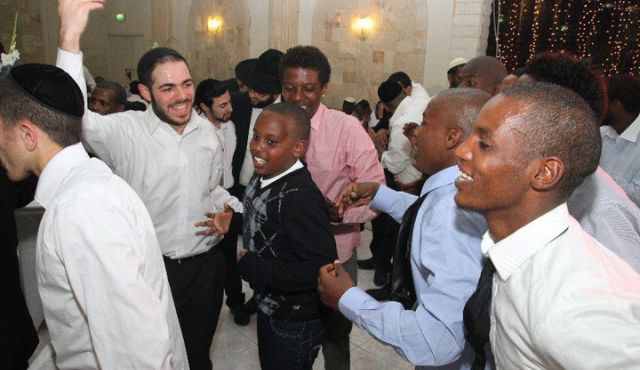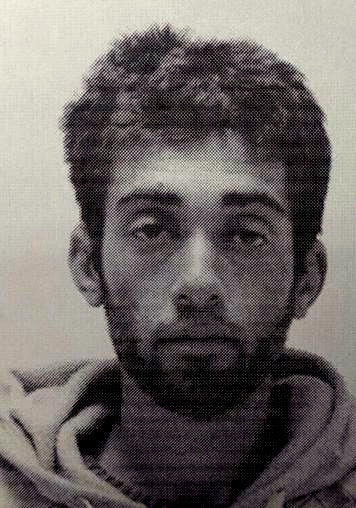
Today, an Israeli judged removed the gag order prohibiting the domestic media from reporting that Avera Mengistu, an Israeli-Ethiopian citizen, crossed the border into Gaza last September and was imprisoned. He has been detained there for the past eleven months. During this time, no Israeli publication could report Mengistu’s name nor could they report the story making him anonymous. They couldn’t even publicly say a gag order existed in his case.
Last October, an Israeli Facebook Friend reported the rumor about Mengistu’s disappearance and possible capture in Gaza. Another Israeli told me such a story had also been reported in the Arab media. On the strength of this, I reported the incident last October, though I didn’t yet have Mengistu’s name.
Last May, an Israeli reader of my blog published a comment naming Mengistu (whose name she spelled “Mangisto”). From there, after many hours of research, international phone calls, and with the help of an Israeli-Ethiopian, I was able to follow the trail leading to his family. Through his father, I was able to confirm that his son was indeed being held in Gaza. Through contacting Israeli-Ethiopian reporters who refused to talk to me about the incident because of the gag, I was able to confirm this aspect of the case as well.
Last month, I published an expose here which named Mengistu and argued that Israel was desperate not to draw attention to the case because he was black. I argued that Gilad Shalit became a folk hero for millions of Israelis because he was a white Ashkenazi. Mengistus, on the contrary, was disappeared.
Why was the gag removed now? Several elements contributed to make this an inevitability. My reporting provided the foundation. But after that, there were underground acts of defiance that were magnificent: Israeli-Ethiopians wore T-shirts at an anti-racism rally in Tel Aviv with Mengistu’s name emblazoned on the front with a huge question mark. MK Zehava Gal-On also began questioning the government about what it was doing to free Mengistu.
The same process occurred in another story I broke regarding the journalist Anat Kamm, who leaked secret IDF documents confirming targeted assassinations that violated Supreme Court rulings. She was “disappeared” too by the Shin Bet, until a brief mention of her occurred in an alternative Israeli media site. That allowed me to confirm her arrest and something of the charges against her. Once I enlisted Judith Miller (yes, that Judith Miller) to report the story on FoxNews (yes, I know), the Israeli security services were becoming a laughingstock and they had to remove the gag. And they did.
The Israeli reporting on the Mengistu story hasn’t added a great deal to what we already knew. There had been rumors that Mengistu suffered from mental instability, which the family has now confirmed. There is also the possibility that he was drunk when he entered Gaza. He had tried several times earlier to leave Israel in this fashion.

Just after we went to press with this article, an Israeli source revealed to MintPress News the identity of the second Israeli prisoner in Gaza. He is Hashem al-Sayyed, age 27, from the village of Hura in the Negev. Like the Mengistu story, al-Sayyed’s captivity is under a gag order and no Israeli media may report his name. Haaretz interviewed his father, who told the reporter that despite claims by Defense Minister Moshe Yaalon to the contrary, no Israeli official had had any contact with him and that he didn’t even know his son was being held in Gaza. Hashem had disappeared on April 20th. He said his son is mentally-troubled and had twice previously cross the border and was returned. Our hope is that just as our story on Mengistu led to the lifting of his gag order a month later, so the same may happen in the case of this Bedouin man.
An Israeli reporting for the leftist Mekomit reports (in English here) there is a second Israeli held by Hamas. He is an Israeli Bedouin, again a member of a subjugated, ill-treated indigenous minority. His predicament was even less known than Megistu’s, which says a great deal about the status of Bedouins in Israeli society.
One aspect of the Israeli coverage of this case struck me particularly: the right-wing NRG (formerly Maariv) reported my role in this story precisely and directly. It noted that I’d recently created a Facebook group, Free Avera Mengistu. It quoted the mission for the group which I’d written. Ynet, a center-right publication, also credited my efforts.
But the “liberal” Haaretz didn’t report a single word on my role. They did to me what Israel did to Mengistu. They erased me and my reporting entirely. But Haaretz patted itself on the back for hiring a lawyer to plead the case against the gag order and get it removed. For that they deserve credit. But without my own original reporting, who knows how or when they could’ve broken this gag.
Of course there is a long history to this. I view my role as being critical of all Israeli institutions which fail to perform their role in promoting civil society. That includes Haaretz. In some ways, I spend more time both discussing and criticizing Haaretz because they are one of the few publications willing to dig into stories concerning issues of social justice; even though their coverage often leaves something to be desired.
Liberal Zionists like Amos Schocken, the publisher, and Aluf Benn, the managing editor, take especially personally attacks on them from the left. They feel that since they see themselves as on the left, they deserve credit for being the only newspaper in Israel with such a political perspective. They refuse to understand that there are bedrock principles of journalism that must be upheld. Every news outlet, whether on the right or left, deserves criticism for failing those standards.
What’s always seemed odd to me about this hostility from the reporters and management of Haaretz is that journalism is a profession in which your work is always on the line. You always have to explain and defend it. If you have a thin skin this isn’t’ the business to be in. Yet Haaretz has the thinnest of thin skins in this regard.
Neither Aluf Benn nor the Haaretz reporter who wrote this story responded to e mail messages requesting that they update their story.
After MintPress published my last report about Mengistu, one of my Israeli readers wrote a Wikipedia article in order to disseminate the information more widely. Within a week, an Israeli started a successful campaign to delete the article, claiming my reporting was unsourced and unreliable. MintPress, not being the New York Times or Haaretz, was deemed deficient as a credible source as well. Other Wikipedia editors agreed and the article too was disappeared (read it here).
The moral of this story is that silence and repression, whether the policies of a government or the news media, are corrosive. Gag orders and censorship of the sort that are rife in Israel deny the public the right to know what its government is doing (or not doing) in its name. It deprives the public from making an informed judgment about those who govern them. In short, it poisons democracy.
Only now that the gag order has been removed can Israeli begin to debate this case. But before that, who kept the candle of freedom and justice burning? Who stood for transparency and speech in the face of a Wall of Silence? Blogs like mine and the courageous Israelis who chipped at that wall in defiance of the authorities.
The government, through these policies of repression enlist the support (willing or otherwise) of the news media. In Israel (and outside) the news media is far too accommodating to the dictates of the rulers. And instead of working with and respecting bloggers who do their job for them when they can’t, they too often dismiss the role that the alternative media play in providing balance to the system.

